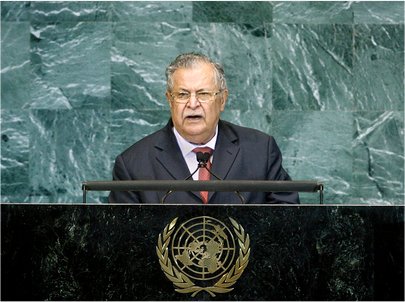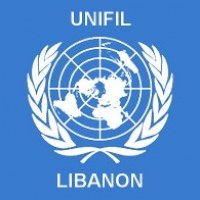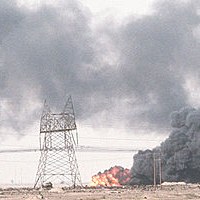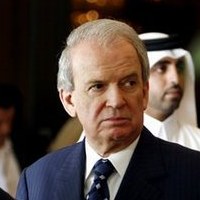![]()
Thu, Sept 23, 2010 | UN TV
President Talabani Addresses the General Debate of the 65th Session of the General Assembly
Address by His Excellency Mr. Jalal Talabani, President of the Republic of Iraq at the General Debate of the 65th Session of the General Assembly of the United Nations (New York, 23-25 and 27-30 September 2010).
Iraq, General Debate, 65th Session
REPUBLIC of IRAQ
STATEMENT BY H.E. MR. JALAL TALABANI
PRESIDENT of the REPUBLIC of IRAQ,
at the GENERAL DEBATE of the 65th SESSION of the
UNITED NATIONS GENERAL ASSEMBLY
New York, 23 September 2010
Transcript:
Mr. President,
Allow me to begin by offering congratulations to you and the friendly people of Switzerland on the occasion of your presiding over the sixty-fifth session of the General Assembly. Our delegation offers our help in the performance of the tasks entrusted to you; we are sure that your experience and wisdom will be an important factor in the success of the General Assembly and the achievement of the goals of the United Nations. I also extend thanks to your predecessor. my close friend Dr. Ali Treki, for his Presidency of the General Assembly at its previous session.
The ongoing political process since the collapse of the dictatorial regime in 2003 has resulted in radical political change in Iraq. This change has resulted in the building of a federal, democratic, independent, and united Iraq with respected constitutional institutions and a government elected in accordance with the constitution. Reaching this goal was neither easy nor simple; Iraq faced many challenges. At the forefront of these challenges was confronting the forces of extremism, sectarianism and factionalism, as well as countering terrorist groups and the groups of the former regime that are trying to return Iraq to the dark times of mass graves and absurd wars. These groups have used various means, including the most heinous crimes, and have allied with organized crime and international terrorist networks across regions and countries in order to reach the goal of destabilizing the security of Iraq. The main task of the Government of Iraq is to provide security throughout Iraq and to strengthen national unity and the rule of law.
Mr. President,
Ladies and Gentlemen,
Since I stood before you last year there have been significant developments in Iraq. This year and the last have witnessed a significant decrease in violence and a marked improvement in the security situation in Iraq. Although some terrorist acts which targeted innocent civilians occurred in different places in the country, the overall improvement in the security situation has paved the way for the withdrawal of United States combat forces operating in Iraq. The complete pullout of these forces on 31 August 2010, was based on the ‘Agreement Between the United States of America and the Republic of Iraq. On the Withdrawal of United States Forces from Iraq and the Organization of Their Activities during Their Temporary Presence in Iraq,’ signed by both parties on 17 November 2008.
This year has also witnessed the success of legislative elections held on 7 March 2010, with considerable Arab, regional and international interest. The United Nations Assistance Mission for Iraq as well as the observers of the Organization of the Islamic Conference, the League of Arab States, the international community and civil society organizations all expressed their conviction that the elections had been transparent and fair.
The principal political parties have been in continuous communication in order to hold a fruitful session of the Iraqi Council of Representatives, which will vote to elect a Speaker for the new Council of Representatives and President of the Republic of Iraq, after which, according to the Iraqi Constitution, the elected President will request the new Prime Minister to form the government. It is our hope that this new government will be formed as soon as possible, as any delay in its formation will negatively affect the security situation, reconstruction and prosperity.
The improvement of the security situation in Iraq has encouraged many Arab and foreign countries to reopen their diplomatic missions, and has helped to develop the relations of Iraq at the regional and international levels. The appointment of new Iraqi Ambassadors in various countries around the world has also helped to promote and broaden the horizons of these relations. The assumption of Iraq to the Presidency of the current session of the Arab League, as well as the Arab Summit Conference in March of next year, will promote the role of Iraq regionally and will be regarded as an important step in the efforts of Iraq to regain its position as an effective and responsible member of the international community. The Government of Iraq will continue to move in this direction; deepening the bonds of friendship, cooperation, and good neighborliness, strengthening the chances of stability and security in the region.
Within the scope of development, on 4 April 2010 the Government of Iraq initiated a National Development Plan for the five-year period of 2010-2014. This plan contains around 2,700 strategic projects in various sectors and will have a total cost of 186 billion U.S. dollars. This plan will help to develop the Iraqi economy and enhance the quality of services provided to Iraqis, as well as create 4 million jobs; a strong positive impact to treat the problem of unemployment in Iraq. This National Development Plan will also aid the return of Iraqi refugees to their homes. The Government of Iraq believes that the real and actual solution for the problem of Iraqi refugees is their return to their homeland of Iraq and their places of residence which they left. Iraq needs the experience of all its citizens to help in building the future of the country. We therefore call upon countries receiving Iraqi refugees, international organizations and civil society organizations to disseminate the culture of voluntary return.
Iraqi women enjoy important status in the new Iraq and have equality with men in their political rights. Women have been granted a 25% share in representation in the Iraqi Council of Representatives. Additionally, for the first time in many decades, the women of Iraq have assumed many important ministerial positions and represent their country as Ambassadors after having been deprived of these rights for more than 30 years. The constitution also guarantees that nationality is granted to their children.
Mr. President,
The Constitution of Iraq formulated the basic principles of Iraq’s foreign policy, which focuses on the observance of good neighborliness and non-interference in the internal affairs of other states, the resolution of disputes by peaceful means, and the establishment of international relations based on shared interests and respect for Iraq’s international obligations. These are constants which Iraqi foreign policy and international relations do not deviate from. On this basis, we seek to establish better relations with Arab and Islamic countries, and are committed to the resolutions of the Arab League and the Organization of the Islamic Conference. In this spirit, we support the Palestinian people’s struggle for the adoption of their Inalienable Rights, including the establishment of a Palestinian State on the land of Palestine, as we work to implement the resolutions of international legitimacy in order that the occupied Arab territories are returned. We consider the Arab Peace Initiative a practical step in the right direction towards resolving the Arab-Israeli conflict in order to accomplish security, peace and stability in the Middle East. We also call for making the Middle East a zone free of nuclear weapons and weapons of mass destruction, which would enhance the prospects for peace and security in the region. In this context, we call on states that have not yet acceded to the Treaty on the NonProliferation of Nuclear Weapons (NPT) to accede to the treaty and comply with its provisions.
With regard to the Iranian nuclear issue, Iraq believes in the legitimate right of states to the uses of nuclear energy for peaceful purposes, a right guaranteed by international conventions including the NPT. We stress the importance of reaching a peaceful solution in dealing with this issue, and that dialogue and diplomacy are the most successful means to achieve that goal. On other hand, any escalation of the matter would hurt the interests of all parties and put the security of the region at risk.
The most important issue that Iraq is still facing at this stage is getting rid of the burden of resolutions adopted under Chapter VII of the UN Charter. By reviewing these resolutions according to Security Council resolution 1859 of 2008, and in response to the report of the Secretary-General contained in document S/2009/385 , we are working very hard along with our friends and members of the Security Council in order to settle all of the issues concerning the situation in Iraq. At the forefront of these issues are the remaining restrictions on Iraq in the field of disarmament, the conclusion of the remaining contracts of the Oil-for-Food program and finding the right mechanism which would guarantee the protection of the Iraqi money to replace the Development Fund for Iraq and the International Advisory and Monitoring Board for Iraq.
Iraq is very serious about putting an end to these files this year. The new elected Iraqi government will also deal seriously with the situation between Iraq and Kuwait and the related issues, such as the maintenance of border pillars, compensation and missing Kuwaiti persons and properties. We will work together with our Kuwaiti brothers, other stakeholders and the United Nations in order to reach a settlement that satisfies all parties without prejudice to our obligations under Security Council resolutions to which we emphasize our respect and commitment.
The situation in Iraq has changed as a result of immense positive developments that have taken place since the collapse of the former regime and the end of the dictatorship; it is drastically different than the situation at the time the Security Council adopted resolution 661 in 1990.
For this reason, and after the adoption of resolution 1859 in 2008 and in light of the Secretary-General’s report in accordance with paragraph 5 of the above mentioned resolution in document S/2009/385, we see that now is the right time for the Security Council to act in response to the report of the Secretary-General and according to its mandate based on the above resolution to review all resolutions adopted against Iraq under Chapter VII, starting with resolution 661 of 1990, in a way that would restore Iraq to its international position prior to the adoption of these resolutions.
Mr. President,
The present political process in Iraq aims to build a federal, democratic, united Iraq, where citizens work within constitutional institutions and the rule of law, human rights are protected and in which all components of the Iraqi people are treated with full respect.
We give huge importance to our capabilities and qualifications as a country rich with natural and human resources to achieve these objectives. However, at this important stage of our people’s life, we need political and economic support, as well as international cooperation in order to stand on a firm base, which will enable us to move towards a future in which we will be able, not only to promote our country and our people’s stability, progress and prosperity, but also to contribute fully to the achievement within the international community of peace, security and sustainable development for all nations.
Thank you for your kind attention. May peace and God’s mercy and blessings be upon you.



 RSS
RSS











President Talabani Addresses the General Debate of the 65th Session of the General Assembly | #iraq #UN #israel http://j.mp/cX0cUA
RT @CrethiPlethi: President Talabani Addresses the General Debate of the 65th Session of the General Assembly | #iraq #UN #israel http://j.mp/cX0cUA
RT @CrethiPlethi: President Talabani Addresses the General Debate of the 65th Session of the General Assembly | #iraq #UN #israel http://j.mp/cX0cUA